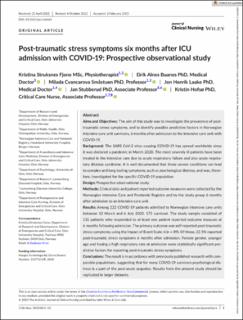Post-traumatic stress symptoms six months after ICU admission with COVID-19: Prospective observational study
Fjone, Kristina Struksnes; Buanes, Eirik Alnes; Småstuen, Milada Cvancarova; Laake, Jon Henrik; Stubberud, Jan Egil; Hofsø, Kristin
Peer reviewed, Journal article
Published version
Date
2023Metadata
Show full item recordCollections
Abstract
Aims and Objectives: The aim of this study was to investigate the prevalence of post-
traumatic stress symptoms, and to identify possible predictive factors in Norwegian
intensive care unit survivors, 6 months after admission to the intensive care unit with
COVID- 19.
Background: The SARS CoV-2 virus causing COVID-19 has spread worldwide since
it was declared a pandemic in March 2020. The most severely ill patients have been
treated in the intensive care due to acute respiratory failure and also acute respira-
tory distress syndrome. It is well documented that these severe conditions can lead
to complex and long-lasting symptoms, such as psychological distress, and was, there-
fore, investigated for the specific COVID-19 population.
Design: Prospective observational study.
Methods: Clinical data and patient reported outcome measures were collected by the
Norwegian Intensive Care and Pandemic Registry and by the study group 6 months
after admission to an intensive care unit.
Results: Among 222 COVID-19 patients admitted to Norwegian intensive care units
between 10 March and 6 July 2020, 175 survived. The study sample consisted of
131 patients who responded to at least one patient reported outcome measure at
6 months following admission. The primary outcome was self-reported post-traumatic
stress symptoms, using the Impact of Event Scale-6 (n = 89). Of those, 22.5% reported
post-traumatic stress symptoms 6 months after admission. Female gender, younger
age and having a high respiratory rate at admission were statistically significant pre-
dictive factors for reporting post-traumatic stress symptoms.
Conclusions: The result is in accordance with previously published research with com-
parable populations, suggesting that for many COVID-19 survivors psychological dis-
tress is a part of the post-acute sequelae. Results from the present study should be
replicated in larger datasets.
Relevance to Clinical Practice: This project provides important insight to post-acute
sequelae after COVID-19 that patients may experience after critical illness.

